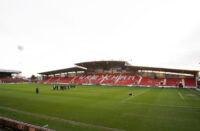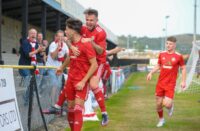Top earners must give more towards grassroots survival
The major problem faced within grassroots football remains ever present, regardless of the money involved in the game. It still continues to show how much this sector needs funding.
The aim for players up and down the country is to be able to enjoy this beautiful game we call football. No matter what standard it is, the feeling of stepping on to that pitch with your mates on a Sunday morning to play in the local leagues is what makes the game so great.
Well, at least this is how it is meant to feel.
However, with continuing amounts of cuts being made at grassroots level, it is having a massive effect on the game. These reductions are resulting in facilities, pitches, changing-rooms and equipment being withdrawn from players, who should expect to enjoy these amenities when they turn up on a Saturday or Sunday morning.
There is now an e-petition calling for the Premier League to contribute 7.5 per cent of the huge television revenue that it generates towards grassroots.
It's crucial that we appeal to the Government to decree that grassroots obtains financial support from the Premier League. With the amount of money the Premier receives from its revenue and sponsorship, it's crucial that these voices and declarations are heard by the Government in order to achieve the funding required.
Government cuts mean that many local authorities are no longer able to fund grassroots football. Fees for basic facilities are climbing to the point where ordinary people are being priced out of our national sport.
The Premier League continues to grow in popularity around the world. Domestic broadcasting rights for 2013-14 to 2015-16 have been sold for £3 billion; combined with global rights, the Premier could bring in as much as £5 billion over the next three seasons.
This cash boost, with grassroots seriously struggling, must not be wasted on ever-increasing wages for players. The Government must ensure that the 7.5 per cent of the money from broadcasting rights goes to fund grassroots.
If the FA and Premier League are unable to do so voluntarily, the Government must be willing to take further action to make it compulsory.
Contrary to this, I accept that the Premier is a business and, also looking at the way in which the FA goes about its line of work, it comes as no surprise. It comes down to one thing – money.
Let's take the coaching badges as a prime example of the many inefficiencies within the FA. A “Level 2” course costs just over £350 and is said to be straight forward. Basically, a badge anyone can do. So the worth of having it is less important than they make out?
Yet another money-earner for the FA, it seems.
When I returned to my car earlier this week, after an intense gym session with the physio, I noticed that my car had a parking ticket wedged between the wipers and windscreen. I was little over five minutes after the time limit that I had paid for with the pay-and-display ticket.
It infuriated me, as one can imagine. The £25 fine doesn't quite tally with being a few minutes late.
Yet the local council are in many ways like these big organisations – inflicting on the public speeding fines and parking tickets and generating money from the back pockets of the community without offering much back.
Back to my point: it appears that the rich get richer and the poor get poorer. Of course, money talks. That said, it is the main root of all the problems from the very top. Money has put so much pressure on the game; it has been damaged with the introduction of Russian and other billionaire owners.
I feel that it has stopped the heartbeat of the game and, ultimately, if people really cared, they would support grassroots.
The “prawn sandwich brigade” is a term that describes corporate or otherwise emotionally detached football fans who attend matches primarily to enjoy the hospitality rather than support a team. In this sense, “brigade” is used pejoratively.
To quote Roy Keane, the former Manchester United and Ireland midfielder: “Away from home, our fans are fantastic. I'd call them the hard-core fans. But at home, they have a few drinks – and probably the prawn sandwiches – and they don't realise what's going on out on the pitch.”
The term originated from a media comment by Keane, who felt certain sections of the crowd at Old Trafford had not been vocal enough in their support and, at times, were too quick to criticise minor mistakes. This occurred during the Champions League game against Dynamo Kiev in November 2000.
This corporate bulls**t exists at the top, where the serious money is being spent. And since ticket prices soared through the roof, it has become evident that no so many of the hard-core fans have been attending Premier League games as they simply can't afford to any more.
However, perhaps this should be encouraging for the local lower-league and non-league clubs as the prices are much cheaper to watch them and, hopefully, they can attract the disillusioned Premier supporters.
This takes me on to my next point. The “David Beckham Franchise”. I don't need to explain what “Becks” has brought to and contributed to this country. He has been an amazing servant both on and off the pitch. That said, Beckham is a brand.
As “The Secret Footballer” and I have established in previous articles, his brain has been taught to think like a businessman and his mind has been nurtured.
This epitomises that of a broker on Wall Street. Alas, like all well-known brands, it is quick to realise that there is always more money to be made, irrespective of the fame and wealth that has already been acquired.
I am a big lover of Becks; he is undoubtedly a role model to many people. Nonetheless, he really encapsulates what is the big issue within English football.
He decides to turn to his beloved American home, 4,000 miles west to Miami, to create a Major League Soccer franchise that may become a magnet for the football world.
I can't exactly say that I respect his decision to make this move. What really angers me is why didn't he create this franchise in the country that gave him his initial opportunity?
I strongly feel that players who have become successful within the English game should give something back to the community.
Whether this is donating to charity, which in Beckham's case has been a strong point, or offering help to local communities, which could combat disease and sickness and assist grassroots football.
The players' wages, certainly in the Premier League, wouldn't be affected if they donated a minute amount to grassroots. I believe this could help benefit the grassroots foundation, which is in desperate need of this before it gets any worse.
It is already affecting the development of the young players rising through. It is clear to see this from just watching the England national team in the past decade. There hasn't been enough progression or development and this starts from the very bottom.
Should more elite players focus on developing grassroots?
It was very encouraging to see that Ryan Giggs and Gary Neville have expressed their interest in investing in a non-league club, Salford City. It has emerged that both of them have held talks over a potential investment in the Evo-Stik First Division North side, who are based just a mile away from the former United training ground – “The Cliff” – where it all started for the pair.
Here we have three players who were brought through the same youth team, members of the renowned “Class of '92”. One wants to promote “soccer” in the US and build a franchise that will become huge globally and attract the best players in the world.
When it comes to money, Beckham is very astute. He most likely chose Miami as it is a big city that will attract big crowds and top-dollar TV rights.
He will “capitalize” massively from his name – and that's without mentioning his pal, LeBron James, the Miami Heat basketball megastar, and his business partner, Simon Fuller.
Becks also has another big investor, Marcelo Claure, the billionaire Bolivian entrepreneur, who knows the market well in America and believes that this idea can only be successful.
In contrast, we have two other players who have shown their interest in taking over a club a little closer to their hearts as opposed to their financial heads. Giggs and Neville have been a little more passionate when choosing where to invest their many millions.
I can only salute them in their plans. This, unlike Becks, is exactly how it should be done. This is giving back to the community that served them so well when they first entered the game.
With funding for this sector in increasingly short supply, it is usually voluntary and community groups who get shortchanged as they lack the resources to argue their corner.
I fully accept and understand that these groups have a vital role to play in local communities. Small injections of cash and other resources can make a significant difference to their reach and impact.
With the likes of Neville and Giggs indicating their desire for injecting investment into their local non-league club, it can only be an encouraging sign for grassroots.
I would like to see more action from elite players in the game, whether it is by donating cash or backing the petition. Maybe Wayne Rooney would kindly contribute some of his money – from his new £300,000-a-week contract – to the foundation.
After all, he once played on his local football field.
* Read The Secret Non-League Footballer's column at www.thesecretfootballer.com
*Follow him on twitter @tsfnonleague






















